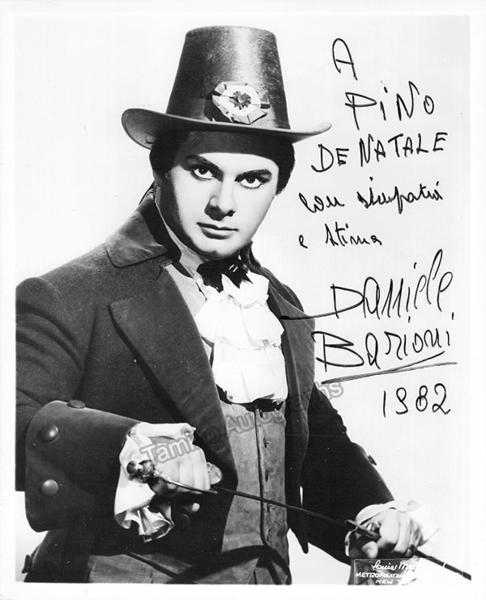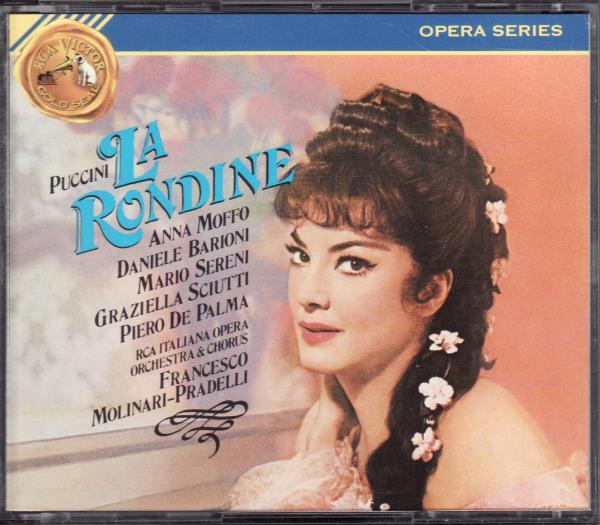|
SATURDEE OPRY LINKS 66:
All-hits, All-the-Time!
 
Daniele Barioni
Anna Moffo
Saturdee Opry Links Overture!
"Don Pasquale," by Donizetti.
https://www.youtube.com/watch?v=-DJ8nHIod5o
1.
It's all-hits-all-the-time, send-'em-home-humming edition of Saturdee Opry
Links. We open with a lilting little item from the astoundingly prolific Gaetano
Donizetti. This is "Quel guardo, il cavaliere...So anch'io la virt¨ magica" or
"That glance pierced the knight's heart. . .I also know the magic. . ." A widow
playfully brags about knowing all the tricks of beguiling a man.
Setting: Norina's house, Rome, early 19th century
Synopsis: Norina, a young widow, Ernesto's beloved,is reading a novel about
love. After reading a passage aloud, she explains that she knows all the tricks
of ensnaring a man. (Years ago, when I organized, promoted, hired and hosted
weekly opera programs at a wonderful Italian restaurant, now defunct, one of the
sopranos used to look at me flirtatiously as she sang this. Sigh.) The first
part of the aria is a sort of introduction. The fun part starts around 2:15.
Here are Anna Netrebko and her trained breasts.
https://www.youtube.com/watch?v=P1u28o1jisc
(Her voice seems too heavy for this. For comparison, here is Beverly Sills.
https://www.youtube.com/watch?v=ul3RXlYsBjo )
Translation:
http://www.aria-database.com/search.php?individualAria=553
2.
Yes, it's a stand-and-sing aria, though in this case Renee Fleming sits and
sings. Bold! Daring! Revolutionary! Er. . .here is the gorgeous "Dove Sono i Bei
Momenti" from Mozart's "Marriage of Figaro." Yes, it's a question I often ask
myself these days: "Where are the lovely moments?" They sure as hell aren't on
CNN or the 405. Well, here is that incomparably pure melody. . .(Note: this, too, begins with a grand sung introduction. The main aria begins at
2:12.)
https://www.youtube.com/watch?v=C430PKW0hOk
Role: The Countess Almaviva, wife of the Count Almaviva
Setting: A hall in Count Almaviva's castle
Synopsis: The Countess describes her wish that her marriage was still as happy
as it once was.
Translation:
http://www.aria-database.com/search.php?individualAria=218
3.
Werther you like it or not, here is Jonas Kaufmann with "Pourquoi me reveiller"
from "Werther," by Massenet. Now, most people---the world, really---adore
Kaufmann. He deserves all accolades, yet his voice is really a baritenor.
Baritone tone, but tenor range. I haven't made up my mind about him---kind of an
acquired taste---but this is undeniably great. And the aria is one of the greatest.
Role: Werther, a poet, about 23 years old
Setting: the Magistrate's house at Christmas, Frankfurt, Germany, 1780
Synopsis: Werther has come back to see Charlotte, his love who is married to
another man. She shows him some of the books that they used to read together.
One book in particular, a collection of Ossain's verses, sparks Werther to ask
spring to cease its gentle caresses upon him, for sadness and grief is now his
fate.
https://www.youtube.com/watch?v=PzKhikZ4oVE
Translation:
http://www.aria-database.com/search.php?individualAria=657
For comparison, here is the much lighter tone of Nicolai Gedda, singing with
piano accompaniment only. Note how on the first "reveiller," he goes small
instead of thunderous, delivering the notes pianissimo. Very effective! When he
repeats the phrase later, he lets it rip, pardon the expression.
https://www.youtube.com/watch?v=V7GQPn2DxI0
4.
"Louise," by Gustave Charpentier, is sometimes called "the French 'La Boheme,'"
for its plot similarity. The opera tells the story of the love between Louise, a
seamstress living with her parents in Paris, and Julien, a young artist. ("Boheme's"
Mimi was a seamstress, and Rodolfo a burned-out ex-journalist writing fiction
that no one reads---oh, wait, that's me. Rodolfo was a poet.) It is the story of
a young girl's desire for freedom, as represented by Julien, and by Paris
itself. Here is lovely Anna Moffo with this moving, delicate aria that
anticipates love and happiness.
https://www.youtube.com/watch?v=dP5y16E4eIg
Setting: a small garden next to the Montmartre, Paris, 1900
Synopsis: Louise describes how her life has changed since moving in with Julien.
She revels in his love for her and her life which grows better every day.
Translation:
http://www.aria-database.com/search.php?individualAria=1203
About Ms. Moffo:
http://www.nytimes.com/2006/03/11/arts/music/anna-moffo-73-a-star-at-the-met-opera-is-dead.html
5.
How, exactly, does one "lighten up" with a baritone aria? Simple: Mozart. Here
is Christian Gerhaher (does he sound like Dietrich Fischer-Dieskau to you?) in a
fun production of "The Magic Flute." "Der Vogelfńnger bin ich ja" ("The
bird-catcher am I!")
Synopsis : Papageno introduces himself to Prince Tamino and also mentions that
he probably could catch women like he can birds.
https://www.youtube.com/watch?v=_J28YyBeAfg
Translation:
http://www.aria-database.com/translations/mflute02_vogel.txt
6.
I think Puccini got "Turandot" wrong. And of course, my opinion is enormously
impotent, I mean important. I think that Turandot, the "ice queen," suddenly
"finding love" and changing her ways at the end (cough, cough, the most
hackneyed cliche of our film-critic-choked time, "redemption"), is preposterous.
Yes, it's a fairy tale, and that justifies anything. But Liu is such a
sympathetic, admirable character, that her death seems especially harsh. I think
someone should rewrite the action, so Liu winds up with Calaf, and Turandot
winds up forsaken, broken. (This would actually be possible, I suspect.) And of
course, riots would break out, cats would stop meowing, and flowers would refuse
to bloom. So forget I said it. Or maybe not. Anyhow, here is the noble Liu, sung by Leona Mitchell,
with "Signore, Ascolta," from "Turandot," by Puccini.
https://www.youtube.com/watch?v=lDMEmYuDmFE
Role: Li˙, a slave girl
Setting: The streets of Peking
Synopsis: Li˙, Calaf, and Timur are in the midst of a processional to the
execution of the Prince of Persia who attempted to win the Princess Turandot by
answering three riddles. If he had given the correct answers, he would have
married the Princess, but the price for incorrectly answering them was death.
During the processional, Calaf catches a glimpse of Turandot, falls in love with
her immediately, and decides to attempt to answer the three riddles. Li˙ sings
this aria to beg him not to risk his life for the Princess.
Translation:
http://operainenglish.blogspot.com/2011/10/signore-ascolta-turandot.html
About Ms. Mitchell:
https://en.wikipedia.org/wiki/Leona_Mitchell
And, for comparison:
https://www.youtube.com/watch?v=UoYAcwTWdjo
7.
Continuing our all-hits-all-the-time SOL collection, here is the world's
shortest great aria or the world's greatest short aria, as I am fond of saying.
"Amor Ti Vieta," from Giordano's opera, "Fedora," which really isn't notable for
anything else. The composer was on a roll, though, when he wrote this. This is Jussi Bjorling, late in life, on stage at Carnegie Hall. After having sung for
over an hour already, I might add.
https://www.youtube.com/watch?v=2Sc2A33CMX0
Role: Count Loris Ipanov
Setting: a party at Fedora's house, Paris, France, late 19th century
Synopsis: Fedora has found out that Count Loris killed her fiance and swears to
avenge his death. As the first step in her plan to capture Loris, she goes to
Paris and attempts to get him to fall in love with her. Later, they are at a
party at Fedora's house and he tells her that he truly loves her.
Translation:
http://www.aria-database.com/search.php?individualAria=1123
8.
It's almost enough to make you pity Pinkerton. Not quite, but almost. The cad,
having seduced (and unknowingly impregnated) the young innocent, Butterfly, says
farewell to Japan, the land that enchanted him, leaving the poor girl behind.
This is "Addio, Fiorito Asil," or "Farewell, flowery isle," from "Madame
Butterfly," by Puccini. The forgotten tenor is one Daniele Barioni, whose big
notes are missed by a cameraman who must have been drunk.
https://www.youtube.com/watch?v=VRQa_vjB9A0
Role: Benjamin Pinkerton, a lieutenant in the US Navy
Synopsis: Pinkerton comes to Butterfly's house and, after speaking to Suzuki,
decides that it would be too painful to say goodbye to Butterfly directly. He
bids adieu to the house in which he and Butterfly spent many happy hours.
Translation:
http://operainenglish.blogspot.com/2013/08/addio-fiorito-asil-madama-butterfly.html
About Barioni:
https://en.wikipedia.org/wiki/Daniele_Barioni
9.
The wonderful Latvian mezzo-soprano Elina Garanca sings one of the most famous
and arresting mezzo arias in opera, "Mon coeur s'ouvre a' ta voix," which
translates to "Cut off your hair, Samson, and I'm home free!" Or something like
that. From "Samson and Delilah," by Camille Saint-Saens.
Role: Dalila, Philistine priestess of Dagon
Setting: the valley of Soreck, ancient Palestine
Synopsis: In an attempt to close the trap which she has set for Samson, Dalila
tells Samson seductively that she will surrender herself entirely to him if he
wants her. She begs him to respond to her caresses, hoping that he will finally
forget about the Israelite rebellion he is leading against the Philistines. If
Samson concentrates completely on her, the High Priest of Dagon may be able to
capture him.
https://www.youtube.com/watch?v=LoXqkUZW7do
Translation:
http://www.aria-database.com/search.php?individualAria=916
About Ms. Garanca:
https://en.wikipedia.org/wiki/El%C4%ABna_Garan%C4%8Da
FINAL BOW:
Ending our all-hits-all-the-time, send-'em-home-humming Saturdee Opry Links
(next week we return to other themes), here is---going out with a bang---the
inevitable "Nessun Dorma," ("None Shall Sleep") from Puccini's "Turandot." Here
with. . .The Three Tenors.
https://www.youtube.com/watch?v=aNQeKvVPPlc
Role: Calaf, the "Unknown Prince", son of Timur
Setting: The gardens before the walls of Peking
Synopsis: A herald has just announced that no one will sleep in the city of
Peking until the Calaf's name is known to the Princess. Calaf, who knows that he
has agreed to be killed if Turandot learns his name before the morning, is not
worried. He is sure that he will be the only one to reveal his name to the
Princess and he will only do that once morning has come and the Princess has
consented to be his wife.
Translation:
http://www.aria-database.com/search.php?individualAria=318
Back to Opera Links
Back to Home Page
|



